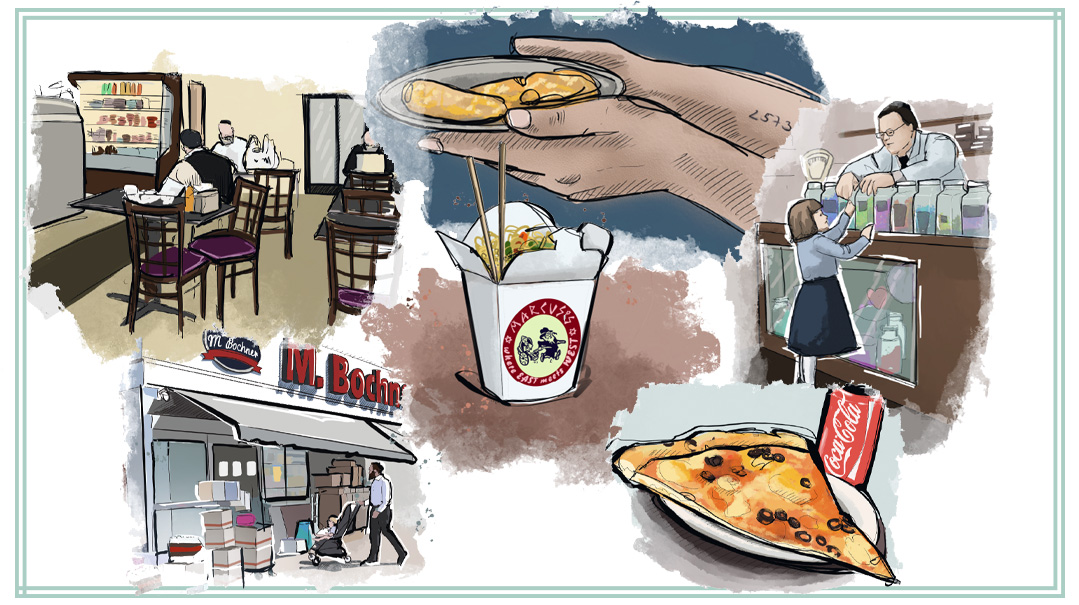Talking Shop

Decades later we’ve built lives, found jobs, maybe even opened businesses of our own, but those stores still retain a sweet spot in our memory. 10 accounts

Project Coordinator: Yosef Zoimen
Editorial Support: Rachel Bachrach
Illustrations: Marion Bellina
We were young and impressionable kids unschooled in enterprise, but even back then we had a favorite haunt — a store, a shop, an eatery. More than a place to buy or sell, the stores of our youth were places where we absorbed enduring values. As we calculated prices or savored the fare, we learned lessons about life’s bigger priorities. Decades later we’ve built lives, found jobs, maybe even opened businesses of our own, but those stores still retain a sweet spot in our memory. 10 accounts

Behind the Counter
M. Bochner Grocery Store
Boro Park, NY
Moshe Feuer
I'M
not sure what gave me the gumption to approach Mr. Moshe Bochner, proprietor of M. Bochner Grocery Store (Est. 1950) at the corner of Boro Park’s 16th Avenue and 50th Street, that day in 1976. I was all of nine years old, and that afternoon my mother had sent me to the corner to pick up a few items.
Mr. Bochner, as I recall, was a man of few words, yet when he did speak it was in a heavily accented English. Most of the time he could be found at the first of two registers just across from the pastry display, wearing black suspenders and deftly typing in prices on the ancient cash register (likely now on display at the Smithsonian). He knew them all by heart and could ring you up without even checking the prices on the faded tape. He was also clearly keeping a keen eye on the Danishes, making sure his customers weren’t squeezing too much when testing their freshness.
My mother had worked in a family bakery in her youth, and she shared with me some insider information that came in handy that day when shopping at Bochner’s. I used my allowance to buy a Danish for yeshivah the next day, and she noted that I could likely bargain down the price on the two-day-old items.
I approached Mr. Bochner and tried bargaining down the cost of the Danish. He must have liked my thrifty outlook on life because he immediately offered me a position in his budding empire: Manager of the Packaging & Preparation for Shipment Dept. of Checkout Quadrant #1… okay, okay, he asked if I could stand behind him and help bag groceries.
We negotiated terms. First, I would complete my homework at home and only then come work at the store a few evenings a week. My compensation: a fresh (same-day) pastry! I could not believe how well my negotiating prowess had paid off. And that’s how I became a sort-of employee at M. Bochner.
F
or those customers who might remember me, I was that cherub-faced kid standing behind the demanding but fair Mr. Bochner as he cajoled me to “pek qvikker — deh customer hev no time to vaste” (and their ten-cent parking meter time was likely expiring).
I also took on another role occasionally. Lined up along the side of the store were the ubiquitous delivery carts — an ingenious contraption that retrofitted a large steel plate to the front half of a bike. This allowed the on-staff delivery boys to stack the grocery boxes and the large brown paper bags (there were no plastic bags back then) and head out on multiple deliveries through the streets of Boro Park.
On rare occasions, Mr. Bochner allowed me to do an emergency delivery of milk or bread down the block or around the corner. That’s where I really made out well. The typical tip I received from these deliveries (sometimes as much as ten cents!) enabled me to buy a single gumball from the large round machine that stood proudly just across the street in front of the famed candy store. If I managed to save up enough tips, I would treat myself to an egg cream soda while sitting proudly on the white-cushioned bar stool.
The candy store is now long gone, and its immediate neighbor Artech Electronics has been closed for some time. Mr. Hartman’s fruit store and the adjoining fish store have also closed their doors. Mr. and Mrs. Edelstein have abandoned their perches behind the counter of their delicious fleishig take-out store, surely reaping their reward in the Olam Ha’emes. The dry cleaners hung their last hanger a number of years back. And who can forget the quaint and charming cluttered bike store run by Mr. Leo Bachi, where he performed miracles on our flat tires each time we thought our bikes were doomed?
Yet the wonderful M. Bochner grocery store continues to survive and thrive. The footprint is still the same as it was back when I worked there. It hasn’t expanded into a mega-mart, yet by some magic, it’s still managing to serve the burgeoning neighborhood just as it did all those years ago.
I recently spent the day in Brooklyn with my twelve-year-old son. Of course, I made sure to stop in and walk the aisles of M. Bochner Grocery Store, and introduce my son to Mr. Bochner’s daughters, who still run the store. The Bochner girls still remembered me and my family.
While they didn’t offer my son a job that day, he did get to choose the pastry of his choice. And I was happy to pay full price for the fresh, delicious, chocolate-custard donut.
Moshe Feuer works in commercial real estate and is involved in various communal projects in Edison, New Jersey, where he lives with his wife and family.
Oops! We could not locate your form.







